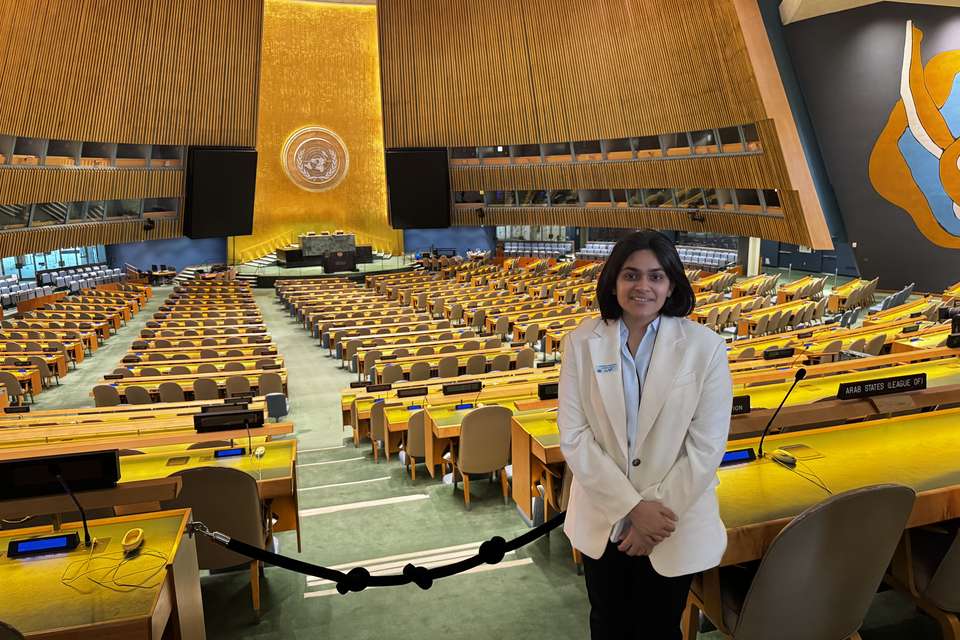UN fellowship recipient leading global change through education

Sumaiya Noor Sanda is using education as a tool to promote peace, human rights and sustainable development on a global stage.
As a CQUniversity Doctor of Philosophy (PhD) candidate in the School of Education and the Arts, Sumaiya said she wanted her research to contribute to positive change, by bridging the gap between global policies and local applications in the Asia-Pacific region.
She is currently exploring how the UNESCO’s 2023 Recommendation on Education for Peace, Human Rights and Sustainable Development is being implemented in the Australian and Asia-Pacific education systems.
“Many well-intentioned policies exist, particularly those from global organisations like UNESCO, but their implementation often falls short in local contexts. This observation became a driving force behind my research," Sumaiya said.
“The values of peace, human rights, and sustainable development through education are fundamental, yet they are often treated as abstract principles rather than being implemented into educational practice.”
Originally from Bangladesh, Sumaiya has also lived and worked in the United States, the Netherlands, and Ireland, building a career that spans education, research, and policy development.
Throughout her career she has worked with United Nations agencies including United Nations Educational, Scientific and Cultural Organization (UNESCO), United Nations Office for Disaster Risk Reduction (UNDRR), United Nations International Children's Emergency Fund (UNICEF), UN Women, and the United Nations Framework Convention on Climate Change (UNFCCC).
The experiences have developed her solid grounding in multilateral diplomacy, human rights, and sustainable development, now informing every stage of her research.
“I have always been curious and passionate about learning, not just in a specific field, but across diverse disciplines and experiences that broaden my understanding of the world.
“I firmly believe that learning should never be confined; every individual is both a learner and an educator in their own way, continuously exchanging knowledge through experience and perspective, both theoretically and practically.
“When I found this project at CQU, I knew it was the right fit. CQU’s involvement in UNESCO and Organisation for Economic Co-operation and Development (OECD) initiatives, and its strength in global citizenship education, aligned with everything I’d done professionally and what I wanted to keep building toward.”
Earlier this year, Sumaiya’s passion and expertise earned her a seat at the table in one of the world’s most selective diplomatic programs with the United Nations Institute for Training and Research (UNITAR).
She was accepted as the only participant from Australia to take part in the UNITAR Global Diplomacy Initiative (GDI) Fellowship, a program that accepts only a handful of fellows globally each year.
“Representing Australia, my university, and my research on this global platform is a huge honour,” she said.
“I wouldn’t be here without the unwavering guidance of my research advisors, His Excellency Dr Angel Angelov, Professor Larisa Schelkin, Dr Karena Menzie-Ballantyne, Dr Trixie James, and the Head of UNITAR’s office at the United Nations in New York, Ambassador His Excellency Mr Marco Suazo.
“I’m also thankful to CQU’s Professor Susan Kinnear and the School of Graduate Research team for supporting my work and aspirations.”
As part of the GDI Fellowship, Sumaiya developed a research paper, subsequently recognised for its excellence and accepted for publication in a UNITAR special edition. She’s also been invited to present it at the United Nations General Assembly Science Summit later this year.
“The intention of my research is to offer context-driven insights that can help translate these foundational values into actionable educational reforms.
“I hope my findings will contribute to ongoing policy dialogues related to the UN’s 2030 Agenda for Sustainable Development and the Asia-Pacific Regional Road Map for implementing the 2023 Recommendation,” she said.
“After completing my PhD, I hope to have the opportunity to work with the UN and contribute to UNESCO, possibly at the policy level.
“I hope to continue working in both academia and industry, as I enjoy both environments and look forward to contributing to the field of science education through evidence-based research.”
